Form, Use and Meaning
There are several structures in English that are called conditionals.
"Condition" means "situation or circumstance". If a particular condition is true, then a particular result happens or could happen.
- If y = 10 then 2y = 20
- If y = 3 then 2y = 6
There are three basic conditionals that we use very often and a few others that are not used as often.
In this package, we will look at the three basic conditionals as well as zero conditional.
People sometimes call conditionals "IF" structures or sentences, because there is usually (but not always) the word "if" in a conditional sentence.
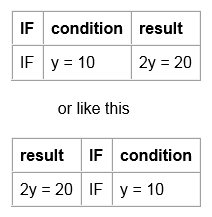
First Conditional: real possibility
Here we are talking about a particular condition or situation in the present that will have some kind of result in the future. There is also real possibility that this condition will happen. For example, you want to go camping but only if the weather is nice. So the resultant action of camping is dependent upon the condition of the weather being fine.
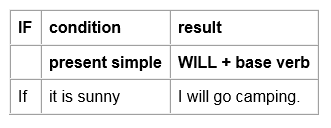
To construct the first conditional, we use
if + the present tense + will + base verb
OR
will + base verb if + the present tense
The important thing about the first conditional is that there is a real possibility that the condition will happen.
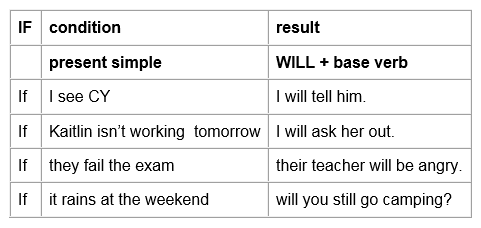
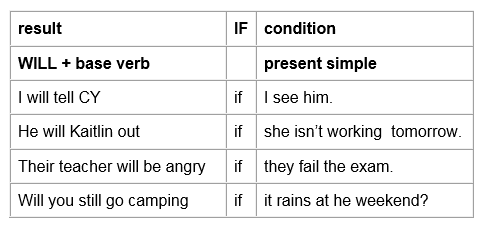
- Sometimes, we use shall, can, could, may or might instead of will, for example:
If work hard, I might pass the exam.
Second Conditional: unreal possibility or dream
The second conditional is like the first conditional. We are still thinking about the future. We are thinking about a particular future result but there is not a real possibility that this condition will happen.
For example, if you do not have a Mark Six ticket, is it possible to win? Of course not. But say for example, you buy a lottery ticket. Is it possible now? Well yes, but the chances are extremely low. So we use the second conditional when we want to talk about a hypothetical, imaginary or highly unlikely condition that would have a hypothetical, imaginary or highly unlikely result.
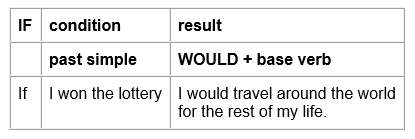
Notice that we are thinking about a future possible result from a very unlikely or imagined condition.
To construct the second conditional, we use:

Here are some more examples:
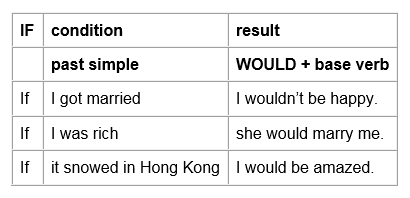
Sometimes, we use should, could or might instead of would, for example:
If I won a million dollars, I could stop working.
Third Conditional: no possibility
The first conditional and second conditionals talk about the future. With the third conditional we talk about the past. We talk about a condition in the past that did not happen. The third conditional is used primarily to talk about past regret or things that happened in the past that we cannot change.
Yesterday, you missed the bus which was in a serious accident 5 minutes later.

Notice that we are thinking about an impossible past condition. The important thing about the third conditional is that both the condition and result are impossible now.
Sometimes, we use should have, could have, might have instead of would have, for example:
If I had not missed that bus, I could have been killed!
Look at some more examples in the tables below:
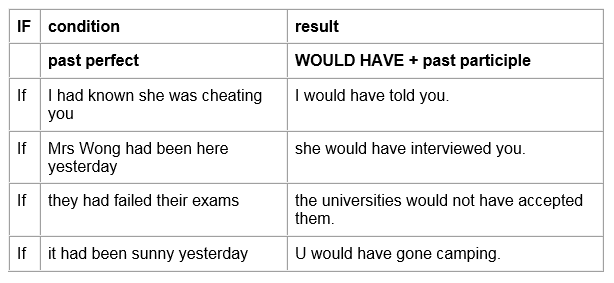
Zero Conditional: certainty
We use the so-called zero conditional when the result of the condition is always true, like a scientific fact.
Take some water. Put it in an ice tray. Put the tray in the freezer. What happens? The water freezes (it becomes ice). You would be surprised if it did not.
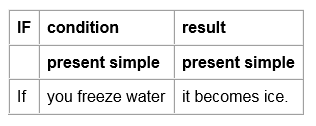
Notice that we are thinking about a result that is always true for this condition. The result of the condition is an absolute certainty. The important thing about the zero conditional is that the condition always has the same result.
We can also use when instead of if, for example: When I get up late I miss my bus.
Look at some more examples in the tables below:
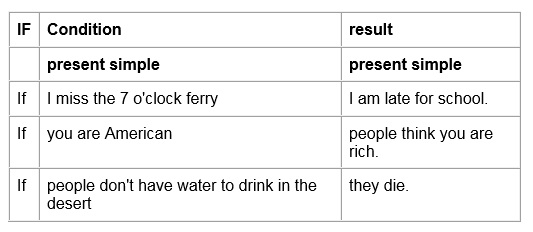
Conditionals: Summary
Here is a chart to help you to visualize the basic English conditionals. Do not take the 50% and 10% figures too literally. They are just to help you.
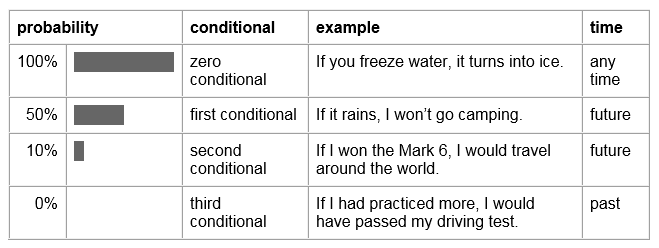
Exercise 1
Exercise 2
Put the verb into the correct form.
Click the tabs to show contents.












